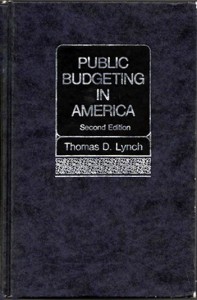Public Budgeting in America Second Edition
Public Budgeting in America second edition.
Library of congress cataloging in publication data
Lynch, Thomas Dexter, 1942-
Public budgeting in America.
Bibliography:P.
Includes index.
1. Budget-United States. I. Title.
HJ2051.L93 1985 350.72’2’20973 84-11487
ISBN 0-13-737354-6
© 1985, 1979 by Prentice-Hall. Inc., Englewook Cliffs, New Jersey 07632
All rights reserved. No part of this book may be reproduced in any form or by any means, without permission in written from the publisher.
Printed in United states of America.
PREFACE
I have made significant changes in this edition, based upon the advice of my fellow teachers around the country, who offered suggestions; of students, who freely expressed their dissatisfaction or indirectly showed their confusion by responding poorly to the next; and of book reviewers, who usually were kind but sometimes were critical. I should include myself in the list of critics, because at some point the first edition seemed to take on an independent existence, allowing me to assess it more objectively.
In reflecting on the changes, I believe that most were prompted by remarkable developments in the professional but that some were prompted by my desire to communicate this complex body of knowledge in a more intelligible manner. Such areas as forecasting and capital budgeting have undergone remarkable changes since 1979. I am still amazed at the rate of change and the increasing sophistication of the subject matter as it evolves. I grouped some topics together and added new material. For example, I grouped all the history sections into one chapter and I added text on double-entry bookkeeping and pension funds.
I manintain the same optimism as I did in the first edition. I was pleased by the many adoptions of the first edition, and I do believe the text has served as a focus for the study of public budgeting. Obviously, not all readers appreciate my pragmatic, practitioner-oriented approach or my extremely terse writing style, which does not fully spell out the implications of the concepts discussed. Nevertheless, the text is appreciated by many, and more readers now share my perspective that public administration, and budgeting in particular, is an applied social science, with the focus appropriately on the public manager. For this, I am particularly pleased.
In this preface, I must also acknowledge my appreciation to so many. First, I thank my critics, who cared enough to let me hear their voices. I am grateful to the following people for their helpful reviews of the manuscript: Khi Van thai, University of Miami. Brian Donnelly, Southern Illinois University; and Peter Colby, SUNY-Binghmton. Second, I thank Prentice-Hall and people like Stan Wakefield. One could not have a better publisher. They know how to combine marketing and production with the more human skill of dealing with writers as sensitive and intelligent human beings. Third, I thank my family for tolerating my urge to write and for their continuing education of me as a human being.
All sins of omission and commissions are still mine. I am continually amazed that errors exist after so many reviews, edits and checks of galleys and proofs. Pretience-Hall has me check them all, and these errors are definitely my responsibility. I still recall the embarrassing omission of a source on a chart in the first printing of the first edition. I hope that any errors in this edition are not significant.
Again, I ask professors and students for comments. Your views are appreciated; and as this edition demonstrates, your comments are useful.
Thomas D. Lynch
Boca Raton, florida.
